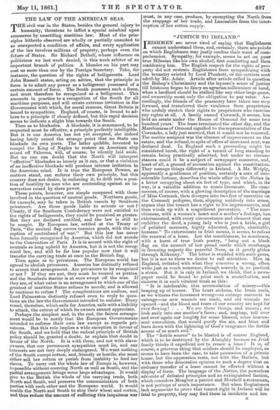THE LAW OF THE AMERICAN SEAS.
THE civil war in the States, besides the general injury to humanity, threatens to inflict a special mischief upon commerce by unsettling maritime law. Most of the prin- ciples hitherto observed are wholly or partially unsuited to so unexpected a condition of affairs, and every application of the law involves millions of property, perhaps even the future of States. Sir Richard Bethell, whose influence on politicians we last week denied, is this week arbiter of an important branch of politics. A. blunder on his part may cost us more than one by the Foreign Secretary. Take, for instance, the question of the rights of belligerents. Lord John Russell states, acting on advice, that the principle in force is to admit any power as a belligerent possessed of a certain amount of force. The South possesses such a force, and must therefore be recognized as a belligerent. This amounts in practice to a recognition of the South for all maritime purposes, and will create extreme irritation in the Government with which, for moral reasons, Great Britain is bound to sympathize. England, of course, is bound to ad- here to a principle if clearly defined, but this rapid decision seems to indicate a slight bias towards the South. Then as to blockades. A blockade, it is announced, to be respected must be effective, a principle perfectly intelligible. But it is one America has not yet accepted, she indeed having lately raised the strange point that no State can blockade its own ports. The latter quibble, invented to compel the King of Naples to restore an American ship seized off Palermo, will, of course, be silently laid aside. But no one can doubt that the North will interpret "effective"' blockades as loosely as it can, or that a violation of an ineffective blockade will produce intense irritation in the American mind. It is true the European Powers, as matters stand, can enforce their own principle, but this country does not desire, in enforcing it, to drift into a posi- tion of hostility to men who are contending against an in- surrection raised by slave power. These points, however, are simple compared with those involved in the question of neutral goods. Northern goods, for example, may be taken in British vessels by Southern privateers. Are those goods liable to seizure or not ? Clearly, if the Southern Confederacy were not entitled to the rights of belligerents, they could be punished as pirates. But they are declared entitled, and the law is still to be sought. By European law, settled at the Treaty of Paris, "the neutral flag covers enemies goods, with the ex- ception of contraband of war." But this law has never been formally recognized by America, which did not accede to the Convention of Paris. It is in accord with the right of neutrals so long upheld by America, but it is not the recog- nized law, and will be far less popular now that it will transfer the carrying trade at once to the British flag. Then again as to privateers. The European world has agreed to abolish privateers. America has distinctly refused to accept that arrangement. Are privateers to be recognized or not ? If they are not, they must be treated as pirates, and the Southern taarine is at once swept off the seas. If they are, of what value is an arrangement to which one of the greatest of maritine States refuses to accede, and is allowed to continue to refuse ? The complications are endless, and Lord Palmerston distinctly refused even to reply to ques- tions on the law the Government intended to enforce. Every vessel, therefore, which sails for America, sails with a liability to attack, the extent of which its owners cannot appreciate. Perhaps the simplest and, in the end, the fairest arrange- ment would be to notify that the European Governments intended to enforce their own law except as regards pri- vateers. But this rule implies a wide exception in favour of the South, and we hold that the radical principle of British policy should be, granted a doubt, to explain that doubt in favour of the North. It is with them, and not with slave- owners, that our permanent sympathies must lie, and our interests are not very deeply endangered. We want nothing of the South except cotton, and, friendly or hostile, she must either sell her cotton or perish from inability to feed her slaves. To carry out the whole law of Europe is, however, impossible without coercing North as well as South, and the partial arrangement brings some large advantages. It would give to the British the whole of the carrying trade, both North and South, and preserve the communication of both parties with each other and the European world. It would enable the North and South to ship their wheat and cotton, and thus reduce the amount of suffering this iniquitous war must, in any case, produce, by exempting the North from the stoppage of her trade, and Lancashire from the inter. ruption of her cotton supply.






























 Previous page
Previous page